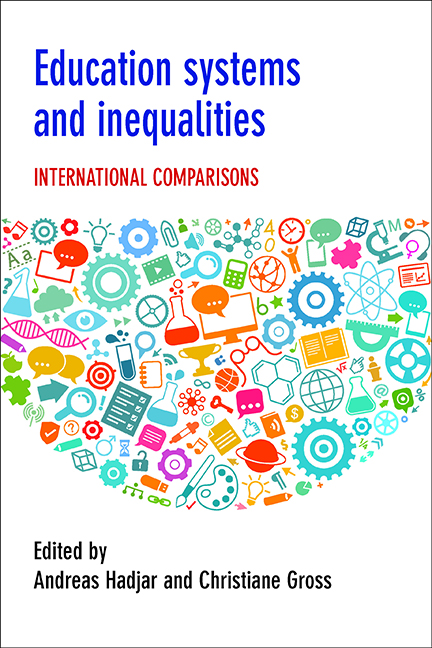Book contents
- Frontmatter
- Contents
- List of tables and figures
- Notes on contributors
- Acknowledgements
- Introduction: education systems and inequalities
- one Theorising the impact of education systems on inequalities
- two Comparing education policies in a globalising world: methodological reflections
- three Education systems and intersectionality
- four Measuring educational institutional diversity: tracking, vocational orientation and standardisation
- five Sorting and (much) more: prior ability, school effects and the impact of ability tracking on educational inequalities in achievement
- six Data analysis techniques to model the effects of education systems on educational inequalities
- seven Education systems and inequality based on social origins: the impact of school expansion and design
- eight Education systems and gender inequalities in educational attainment
- nine Tracking, school entrance requirements and the educational performance of migrant students
- ten From exclusion and segregation to inclusion? Dis/ability-based inequalities in the education systems of Germany and Nigeria
- eleven Education systems and meritocracy: social origin, educational and status attainment
- twelve Education systems and gender inequalities in educational returns
- thirteen Education systems and migrant-specific labour market returns
- fourteen Health returns on education and educational systems
- fifteen Good and bad education systems: is there an ideal?
- Conclusions and summary
- Index
fifteen - Good and bad education systems: is there an ideal?
Published online by Cambridge University Press: 05 April 2022
- Frontmatter
- Contents
- List of tables and figures
- Notes on contributors
- Acknowledgements
- Introduction: education systems and inequalities
- one Theorising the impact of education systems on inequalities
- two Comparing education policies in a globalising world: methodological reflections
- three Education systems and intersectionality
- four Measuring educational institutional diversity: tracking, vocational orientation and standardisation
- five Sorting and (much) more: prior ability, school effects and the impact of ability tracking on educational inequalities in achievement
- six Data analysis techniques to model the effects of education systems on educational inequalities
- seven Education systems and inequality based on social origins: the impact of school expansion and design
- eight Education systems and gender inequalities in educational attainment
- nine Tracking, school entrance requirements and the educational performance of migrant students
- ten From exclusion and segregation to inclusion? Dis/ability-based inequalities in the education systems of Germany and Nigeria
- eleven Education systems and meritocracy: social origin, educational and status attainment
- twelve Education systems and gender inequalities in educational returns
- thirteen Education systems and migrant-specific labour market returns
- fourteen Health returns on education and educational systems
- fifteen Good and bad education systems: is there an ideal?
- Conclusions and summary
- Index
Summary
Is there such a thing as an ideal education system? My answer to that question is a resounding yes. Findings from empirical education research and lessons from educational practice converge on a set of systemic key features. These key features are identified and promoted in the programmes of most political parties and associations in many European countries. If education systems continue to fall short of that ideal in some respects, it is not because we do not know what an ideal education system might look like but rather because we fail to make the necessary changes to the existing systems.
What are the undisputed goals and features of an ideal education system? How can they be implemented? The authors in this volume have done an outstanding job in finding answers, which is why this chapter can largely be limited to a few additional comments. It starts with a brief summary of the goals an education system must achieve, followed by a discussion of the structures and cultures that shape these goals and support the path towards achieving them. The third section addresses the question of whether the concepts of standardisation and stratification are systematically related to good and bad education systems.
Goals of good education policy
The goals of good education policy are largely uncontested and are specified in many seminal contributions to the sociology of education. In this chapter I primarily rely on Allmendinger (2012) and Allmendinger et al (2014), two pieces that have recently summarised existing knowledge.
Inclusion. A good education system is one that is open at no charge to all individuals, helping them to fully realise their unique potential. In other words, children's socioeconomic background, their place of residence, their parents’ countries of origin and whether or not they have physical or mental disabilities, should be irrelevant. The goal is to provide equal access to education and to achieve the best possible educational outcome for each learner. The dual nature of this imperative is important: equal access and optimal support. Promoting equal access to education alone is far from sufficient. It is perfectly possible to provide opportunities and then simply sit back and wait to see who takes advantage of them and how, but it is also possible to encourage people to embrace these opportunities and to actively support them in making the most of their potential.
- Type
- Chapter
- Information
- Education Systems and InequalitiesInternational Comparisons, pp. 321 - 334Publisher: Bristol University PressPrint publication year: 2016



